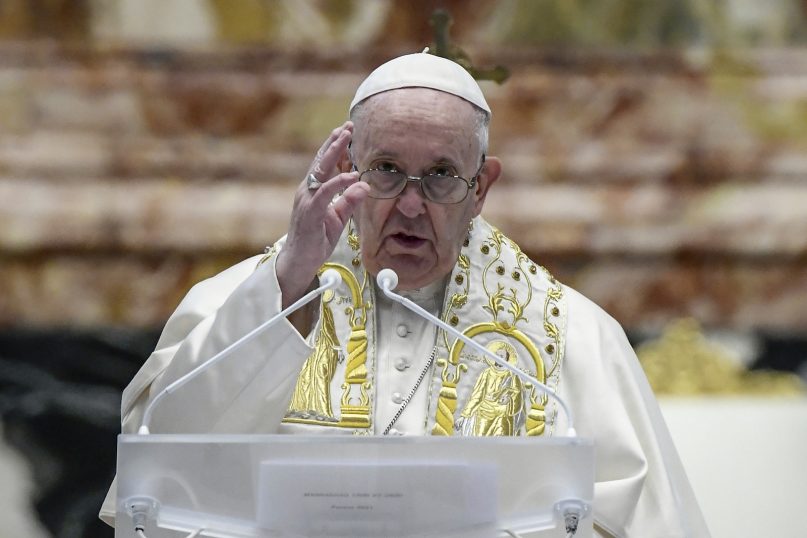VATICAN CITY (RNS) — In his Easter message, the Urbi et Orbi, Pope Francis held up Christ’s resurrection as a symbol of hope in the “difficult situation” humanity is faced with as the world is buffeted by a global pandemic.
“The risen Christ is hope for all who continue to suffer from the pandemic, both the sick and those who have lost a loved one,” Francis said, speaking from inside St. Peter’s Basilica on Sunday (April 4), his message broadcast to millions of Catholics worldwide.
The pope prayed especially for the doctors and nurses, underlining that “everyone, especially the most vulnerable among us, requires assistance and has the right to have access to necessary care.” He voiced the need for governments to come together to make sure everyone who needs vaccines gets them.
“Vaccines are an essential tool in this fight,” said Francis, who has already received the vaccine. “I urge the entire international community, in a spirit of global responsibility, to commit to overcoming delays in the distribution of vaccines and to facilitate their distribution, especially in the poorest countries.”
The pope recognized the need for governments and institutions to support families and individuals who suffered financially due to the pandemic as well. He prayed especially for young people, who were kept away from school and friends for more than a year in some countries.
“Experiencing real human relationships, not just virtual relationships, is something that everyone needs, especially at an age when a person’s character and personality is being formed,” he said.
In Urbi et Orbi — Latin for “to the city and the world” — popes traditionally address every corner of the world. Francis, whose latest encyclical, “Brothers All,” is an exhortation to pursue peace, signaled his commitment to ending the violence that has continued in many countries despite the pandemic.
At one point he condemned the “race for new weaponry” countries continue to engage in. “There are still too many wars and too much violence in the world!” he said. “May the Lord, who is our peace, help us to overcome the mindset of war.”
But he sent particular wishes of peace to various people threatened by conflict. To the “young people of Myanmar,” where pro-democracy protesters have suffered violent repression and even death at the hands of the military government, the pope expressed his “closeness” and a reminder that “hatred can be dispelled only by love.”
Francis’ thoughts were with the countries of the Middle East, particularly “beloved and war-torn” Syria, which entered its tenth year of conflict worsened by heavy sanctions. He remarked on the “deafening and scandalous silence” surrounding the civil war in Yemen and the “internal violence and international terrorism” in Africa.
RELATED: Pope Francis has not forgotten the people of Syria, says cardinal
The pope also prayed for Libya, weakened by a decade of violence, and asked that prisoners of conflicts, from the Ukraine to the disputed territories near Azerbaijan, be returned safely to their families.
“On Jerusalem,” Francis asked that “Israelis and Palestinians will rediscover the power of dialogue for reaching a stable solution that will enable the two states to dwell side by side in peace and prosperity.”
After becoming the first pope to make an apostolic visit to Iraq in early March, he prayed that the country, still struggling to find its footing after decades of war, “may continue along the path of peace and thus fulfill God’s dream for a human family hospitable and welcoming to all his children.”
Hospitality, especially toward immigrants and refugees, was also an important part of the pope’s message to the faithful. He praised countries like Lebanon and Jordan for welcoming many refugees fleeing the conflict in Syria and asked that “the light of the risen Jesus be a source of rebirth for migrants.”
Finally, the pope acknowledged the places where Christians are not able to celebrate the day’s festivities freely. “We pray that those restrictions, as well as all restrictions on freedom of worship and religion worldwide, may be lifted and everyone be allowed to pray and praise God freely,” he said.
In China, the so-called “Sinicization” of religious beliefs has been solidified by a Beijing-Vatican deal on the appointment of bishops, which critics believe may undermine the Vatican’s ability to condemn China’s continued human rights violations. China’s treatment of its Uyghur Muslims was not mentioned in the pope’s global address.
The pope recognized that Easter is not a “magic formula” capable of dispelling the countless struggles facing the Catholic Church and the world. But “in the face of, or better, in the midst of this complex reality, the Easter message speaks concisely of the event that gives us the hope that does not disappoint: “Jesus who was crucified has risen.”
RELATED: In Easter vigil homily, Pope Francis invites Catholics to set out ‘on new paths’





